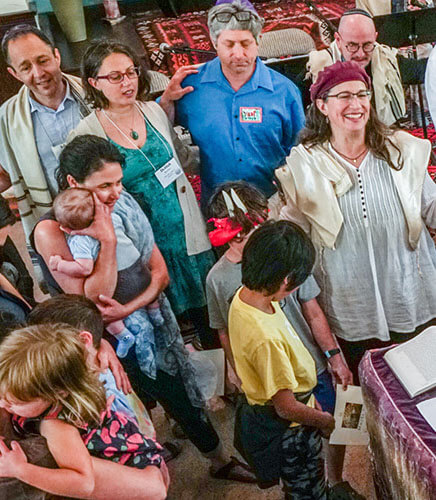Experiencing G-d as a Formerly Secular Jew
Chochmat HaLev Member Story
Mischa Byruck, Rosh Hashanah 5784
Shana Tova.
My name is Mischa Straus Byruck, (Mi Shebeirach) and I joined Chochmat this year.
Though I know I look SUPER Jewish, I wasn’t raised with religion, and this is the first temple I’ve ever belonged to.
My parents, who are both here today for the first time, represent the two extremes of the Jewish diaspora story in America.
On my mother’s side, the Strauses: German, illustrious, wealthy and celebrated. Her great-grandfather founded Macy’s; his brother was the first Jewish Cabinet Member in US History and served as ambassador to the Ottoman Empire.
My father’s family story couldn’t be more distinct: The Bayroch family were Polish immigrants to England, impoverished and traumatized, the family eviscerated by the pogroms and the Shoah. His father was a journeyman tailor on the streets of London’s Jewish Ghetto, who bought and resold the clothes of men whose deaths he read about in the Jewish Chronicle. He kept his inventory in their Penny Lane flat, dark flannel suits wrapped in brown paper and sealed with white twine.
My father was the only one from his neighborhood to graduate college and rejected his Judaism as part of his self-reinvention when he came to America. My mother’s Judaism, meanwhile, was lost to the exigencies of New York aristocracy.
So while I grew up not three miles from here, in the Hills above Codornices Park, I was never a bar-mitzvah and we never went to temple, even for the High Holidays. Judaism for us was only cultural, a compromise between assimilation and the rejection of orthodoxy.
We set a menorah out, next to the Christmas tree in Winter, and in the Spring, my mother held a Jungian Passover, filled with Joseph Campbell-inspired allegories, and with an orange dead center on the seder plate.
And I spent my life rejecting Judaism in the way of a classic liberal, preferring the bland security of secular whiteness to an ethnic heritage from which I felt entirely disconnected.
So it was a surprise to ALL of us, this year, when I got an email from Zvika, who I’d known only socially, and decided, for the first time, to attend Temple.
And so it was that one bright Friday evening I walked through the doors at Chochmat.
And as soon as the congregation raised their voices in song, I began to weep. A flood of epigenetic memories coursed through me; I FELT my ancestors, both Straus and Baruch, cheering me on; welcoming me back to the path.
I left shaken, unable to fully process or explain these voices.
But then I came back and, once again, experienced the inexplicable. For the first time in my life, I felt the presence of God: unmistakable. Insistent. And loving. Hineni, I said. I am here.
I joined at the full membership price only a few months later, and it was a surprisingly easy decision. I am consistently inspired by our members’ generosity and willingness to support the spiritual evolutions of people like me who are baal teshuvah; returning to the path.
At the invitation of other members, I have immersed myself in Jewish learning, and attended inspiring Jewish events. I’m on lots of Jewish WhatsApp group threads now, and I love it. Chochmat is where I experience the kind of values-aligned Jewish community I never thought possible.
And most importantly, Chochmat is where I cultivate mochin d’galut: expanded consciousness: It is where I transcend, through grace and song and laughter, the individual through the communal, where I move from secular into sacred space.
When I joined, and when I give my $18 after each service, I think of the thousands and thousands of secular Jews who, like me, have allowed their beautiful ethnic and religious heritage to be eclipsed by the allure of whiteness; their Judaism reduced to a series of jokes about noses, lawyers, space lasers and Hollywood. Jews who have never felt the love and strength of community and prayer.
As Zvika recently quipped to a reporter about his congregants “I don’t want to talk about God, or learn about God, I want to experience God.” Chochmat is where I experience God.
Rabbi Benay Lappé speaks of the welcome arrival of a Jewish future that would be unrecognizable to us today, just as Rabbinic Judaism was to the Temple Jews 2000 years ago.
Her vision is dynamic and compassionate, queer and antiracist, sex-positive, embodied, earth-based and joyous. It honors our past while looking expansively to the future and is unafraid to elevate, above even the study of Torah, the experience of God’s love through Svara, or moral intuition.
This is the future represented by Chochmat HaLev. And while it might be unrecognizable to us, to our parents, or to my ancestors on both the Straus and Bayroch sides, it is the future we need; the future Judaism needs.
I hope you join us, so we may usher in this future together. Thank you.
